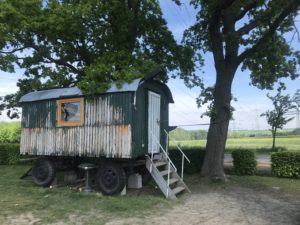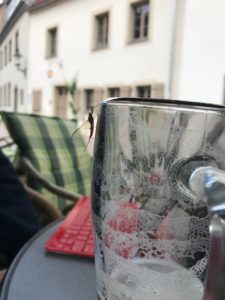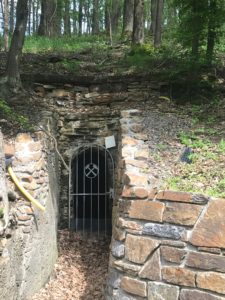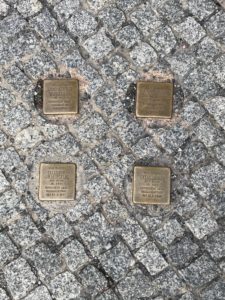In which Sid and Doris ride through Eastern Germany on European Election Day.
The route over the top of Chemnitz was chosen to optimise road surface, the incidence of towns with hotels and not too much climb. This has meant some long and some shorter days. Today should have felt like no more than a stroll in the country but somehow seemed harder work than that.
Metrics for this Sunday:
Distance: 80 kilometres
Climb: 940 metres
Weather: Worth having the Factor 50 but not hot
The route was quite ruthless in cutting out visits to village squares in the valley or on top the hill. Breakfast was determined and involved making up the illicit cyclists’ lunch time rolls. Bonking is a term that non cyclists may not know. It means running out of fuel. So though we expected such villages as we would go through to be shutshutshut we had enough food to get by.
We took a long time to get up to speed, possibly due to the amount of breakfast we were trying to ingest. And we never really got to a happy cruising pace. Pro cycling teams have sports psychologists. We recognise ‘upper spine injuries’. Clearly the brains of Doris and Sid are finely honed calculating machines. So the undermining items must be lower down, hence the upper spine. It is here that unreasoning feebleness takes root and fails to drive the legs around. Of course it may be that the legs really are suffering but sometimes it is difficult to tell the difference between the upper spine and the upper leg.
 There were long hills with brief episodes of 9% gradient. Either way we were not in our stride like yesterday. Lunch was by a sort of caravan we have seen all through East Germany. A late cafe stop found hot chocolate with whipped cream; diesel for cyclists.
There were long hills with brief episodes of 9% gradient. Either way we were not in our stride like yesterday. Lunch was by a sort of caravan we have seen all through East Germany. A late cafe stop found hot chocolate with whipped cream; diesel for cyclists.
So, what was there to see? Today has been European Election Day in Germany so we have seen all sorts of buildings used as Polling Stations. In the small villages the most official building is the Volunteer Fire Brigade where in one the firemen were using the occasion to have a party selling saus and goulash to the voters.
 We were delighted to find Tosso Scholtz as he reminded us of such persons as should never be elected to high office as Jacob Rees Mogg or Boris Johnson. (Oh please, no.)
We were delighted to find Tosso Scholtz as he reminded us of such persons as should never be elected to high office as Jacob Rees Mogg or Boris Johnson. (Oh please, no.)
Sunday is a good day to get your toys out. We only saw one cycle peloton in full club kit. At one of the villages there was a gathering of Ossi two strokes so for about a half hour we saw CZs, MZs, and Jawas coming towards us, all of which were sold in the UK in the 1970s. On his own, possibly ostracised for being a four stroke, a Royal Enfield. The cars have not shown well today and the four wheel award goes to a Robur panel van, made locally in about 1967?
 Had we been in France we would have been in La France Profonde but we were in Germany. If anyone knows the German equivalent do tell. Anyway, I saw a De Tomaso Deauville. A Dalek would seem scarcely more common in Thuringia.The nature notebook offers llamas, jays and swifts, plus a most elegant insect sharing Doris’s beer. [Not much beer left to share, heh heh – D.]
Had we been in France we would have been in La France Profonde but we were in Germany. If anyone knows the German equivalent do tell. Anyway, I saw a De Tomaso Deauville. A Dalek would seem scarcely more common in Thuringia.The nature notebook offers llamas, jays and swifts, plus a most elegant insect sharing Doris’s beer. [Not much beer left to share, heh heh – D.]

 Freiberg was a “free mountain”, declared so by the local Graf because the more miners who came,the more silver was extracted and the more taxes were levied. There was silver mining from the 12th C.
Freiberg was a “free mountain”, declared so by the local Graf because the more miners who came,the more silver was extracted and the more taxes were levied. There was silver mining from the 12th C.
As the technology improved (like pumping out ground water) the mines went deeper. In the mid 1930s the mines were repurposed to produce copper and zinc for the rearmament. In 1969 it was all shut down as the cost of production outran world prices. Now rare Indium and Germanium are being mined.
 Our hotel in the Obermarkt housed the administration of ration cards during the war and immediately after was the Soviet town jail until 1950. It has been refurbished since then. To mark the loss of the town’s Jews they have put in stumbling blocks to remind you of who lived on these streets before 1933; when they were deported and where they died.
Our hotel in the Obermarkt housed the administration of ration cards during the war and immediately after was the Soviet town jail until 1950. It has been refurbished since then. To mark the loss of the town’s Jews they have put in stumbling blocks to remind you of who lived on these streets before 1933; when they were deported and where they died.
Sid and Doris have been around the town and have found a most hip sort of gemutlicheit diner. All being well tomorrow takes us through Saxony into Bohemian Czechia so Sid is practicing with beef goulash. That seems more Hungarian, but hey, it was all part of the Austro Hungarian Empire and hard to disentangle. Parts of Czechia were known as Sudetenland, claimed by Germany in 1938. After the war Germans in Czechoslovakia were forced out as millions of people of the wrong nationality or ethnic group in the wrong place took to the roads.
So, rather less urgently we take to the road tomorrow in the direction of what is now Czechia, part of a greater Europe as it has been several times before. Ho for Lovosice.
 Sid’s #virtualsouvenir today was going to be the very splendid Matchbox refreshment caravan in the middle of this picture. But then he saw the architectural bricks behind them and remembers fondly playing with wooden blocks like this. And it probably explains a lot of the more recent local architecture.
Sid’s #virtualsouvenir today was going to be the very splendid Matchbox refreshment caravan in the middle of this picture. But then he saw the architectural bricks behind them and remembers fondly playing with wooden blocks like this. And it probably explains a lot of the more recent local architecture.